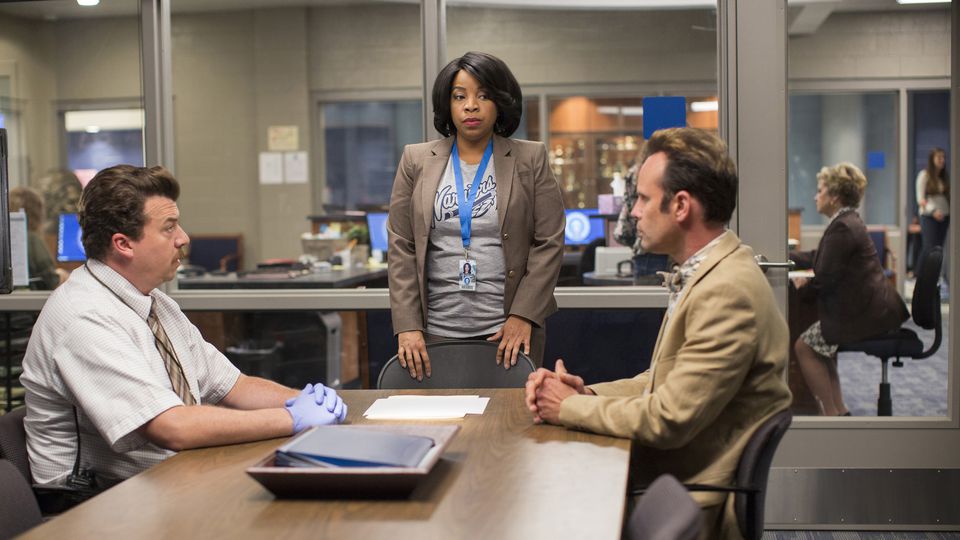(This article contains spoilers from the first season of Vice Principals. If you want to avoid them just know that this series comes highly recommended)
One of my favorite things about Jody Hill’s Eastbound and Down is the way that each season is structured like a movie. Moreso than most serialized series, these season arcs are designed with a real beginning, middle, and end, and the characters go through significant arcs from start to finish. Vice Principals follows a similar model, making it a difficult show to judge after just a few episodes.
I was not a fan of the Vice Principals pilot. The characters it presented seemed one-dimensional and plot points flew in and out too quickly to pique my interest. Danny McBride and Walton Goggins seemed to be portraying similar characters to what they had done on the past, and the show felt like it was coasting. But I stuck with it on the strengths of Eastbound and Down, which grew by leaps and bounds over its initial season. I’m pleased to report that this was the right decision.
In its entirety, the first season of Vice Principals is one of my favorite television debuts of the year. As I hoped, the apparent flaws of the pilot stemmed from the series’ structure. Before delving into the characters, Jody Hill and Danny McBride decided to establish the premise right up front. The episodes that followed immediately complicate the audience’s notion of events.
First, the show shocks us in its second episode by escalating events far beyond what the audience is expecting. The pilot suggests that the series will focus on McBride and Goggins’ uneasy partnership and their efforts to supplant their new superior, but aside from workplace gossip, they don’t demonstrate any criminal intent. So when they immediately resort to burning her house down, it sets us up for the unexpected. With just two episodes, Vice Principals establishes a tone which allows it to vacillate wildly between petty school politics and serious wrongdoings.
The next three episodes are just as important, focusing on deepening the characters of Neal Gamby, Lee Russell, and Belinda Brown. Each character gets a whole episode devoted to his or her struggles, and with the extra depth, they cease to be caricatures. Jody Hill isn’t afraid to give his characters flaws, nor is he concerned about making them behave in especially unlikable ways, because he genuinely cares about them. This empathy is the key to Vice Principals, as well as Eastbound and Down: despite our best notions of right and wrong, we can’t help but feel for his creations because they are so fleshed out.
That’s not to say that Vice Principals is as openly challenging to its audience as Eastbound and Down. No character on the show is as brazenly awful as Kenny Powers, so the fact that you sympathize with most of them at the end of 9 episodes is perhaps not quite as miraculous as Kenny Powers’ likability toward the end of season 1. But these characters do commit horrible acts, often toward each other, and Vice Principals mines dramatic gold from them. The climactic scene on the train tracks during the finale is hurtful because it draws on so many different dramatic conflicts that the audience has become invested in. We like Gamby and Russell’s friendship because we’ve seen it grow into something real over 9 episodes, but we also love and respect Belinda Brown. Gamby feels similarly, and while his hesitance is played somewhat for laughs, it is also the culmination of a whole seasons worth of character growth.
It’s also worth noting that Vice Principals is really fucking funny. The show is a comedy first, after all, and it has stacked the deck with terrific performers. McBride’s character first comes off like a toned-down Kenny Powers, but he reveals himself to be far more self-aware. The show mines a lot of humor from Gamby’s inappropriate outburts, but where Kenny Powers’ rudeness stemmed from an obliviousness to the thoughts and concerns of others, Gamby’s occasional cruelness is rooted in his own insecurities and a desire for authority. Meanwhile, Walton Goggins proves himself to be as exceptional with comedy as he is with drama, portraying Lee Russell as something of a southern dandy, his masculinity constantly in question. His partnership with Gamby is all too natural: they’re both highly insecure men who feel like they have to fight to prevent the rest of the world from tearing them down.
Finally, relative newcomer Kimberly Hebert Gregory is terrific as Belinda Brown. She’s given a wealth of material to work with, portraying Brown as a force to be reckoned with who is simultaneously vulnerable in her personal life. Gregory gets to be hilarious (especially during her tragic undoing), but gives real dimensions to a character who could have been an afterthought. I’m looking forward to seeing her appear in other things.
I continue to be impressed with Jody Hill. Despite many criticisms of his work being cruel or hateful, I think he’s one of the most truly empathetic figures in modern film and television. He’s not afraid to look into the hearts of discomforting figures and find something human and relatable. His characters aren’t so simple that they can be summed up in 30 minutes of television; we often need a few hours to get what makes them tick, but the journey is always worth it. Vice Principals continues this trend, and i look forward to seeing how it progresses in is second (and final) season.
